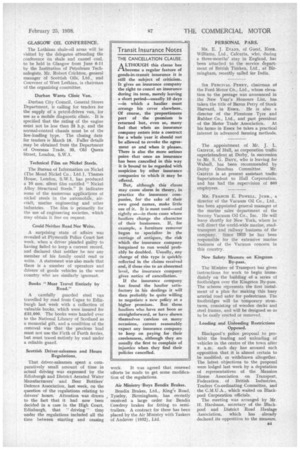Transit Insurance Notes
Page 35

If you've noticed an error in this article please click here to report it so we can fix it.
THE CANCELLATION CLAUSE.
A LTHOUGH this clause has LAbecorae a regular feature of goods-in-transit insurance it is still the subject of criticism. It gives an insurance company the right to cancel an insurance during its term, merely leaving a short period—usually-10 days —in which a haulier must arrange his cover elsewhere. Of course, the proportionate part of the premium is returned but, even so, many feel that when an insurance company enters into a contract for a whole year it should not be allowed to revoke the agreement as and when it pleases. There is also the more serious point that once an insurance has been cancelled in this way it is bound to be regarded with suspicion by other insurance companies to which it may be
offered. '
But, although this clause may cause alarm in theory, in practice the insurance companies, for the sake of their own good names, make little use of it. It is most used—and rightly so—in those cases where hauliers change the character of their buainesses. If, for example, a furniture remover began to specialize in the carriage of antiques, the risk which the insurance company bargained to run would probably be doubled. Usually, any change of this type is quickly reflected in the claims received and, if these rise to an abnormal level, the insurance company gives notice of cancellation.
If the insurance company has found the haulier satisfactory in his dealings it will then probably be quite willing to negotiate a new policy at a higher premium. But those hauliers who have not been so straightforward, or have shown themselves careless on many occasions, cannot reasonably expect any insurance company to keep on paying for their carelessness, although they are usually the first to complain of injustice when they find their policies cancelled.
































































































